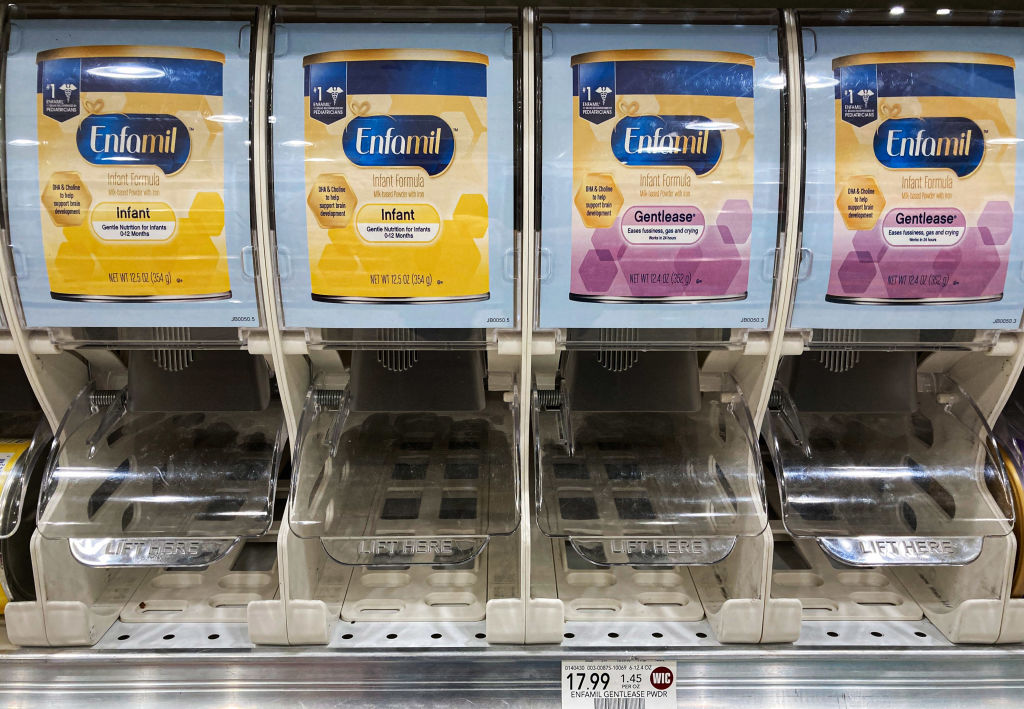
(Photo by Drew Angerer/Getty Images)
There’s a shortage of baby formula in the US, and the February shutdown of the nation’s largest manufacturer only made it worse. But don’t worry; the facility is reopening soon, and Congress and the White House are ready to save the day and solve the problem they helped create. When a government solution creates an even bigger issue, more and bigger government solutions are always just what the doctor ordered.
A Nutrient Deficiency
The Abbott Laboratories plant in Sturgis, Michigan shut down in February pending a federal investigation after several infants – two of whom died – suffered severe illnesses potentially linked to contaminated formula. With two lives lost and potentially many more at risk, the company and investigators had to do their due diligence. Production was halted, and supplies already shipped were recalled from stores nationwide. According to the FDA, one pathogen linked to the illnesses, Cronobacter sakazakii, was discovered in “nonproduct contact areas of the facility.” However, the agency said that no evidence links the illness to the facility, and none of the unopened containers of formula from the affected families tested positive for contamination. According to the company, with FDA approval, they can begin making formula again in about two weeks.
Meanwhile, as much as 43% of normal supplies of formula were out of stock in grocery stores across the nation the first week of May, and Abbott Labs warns that it will be six to eight weeks before they’re shipping out again. Also, identifying the source of the contamination – whether it’s this manufacturer or not – must remain a public health priority.
A Pound of Cure
Republican lawmakers called on the Biden administration to take action. So, he did. The president spoke with major retailers and manufacturers across the country, including Wal-Mart, Target, Reckitt, and Gerber, and proposed a plan of action.
“The federal government – including the Food and Drug Administration (FDA), Department of Agriculture (USDA), Department of Justice (DOJ), Department of Transportation (DOT), U.S. Trade Representative (USTR), Department of Homeland Security (DHS), Department of Commerce (DOC), and the White House – has worked diligently over the last few months to address the shortfall in infant formula production while the Sturgis plant remains offline,” a fact sheet from the White House declared.
The plan moving forward includes the following steps:
- Cutting Red Tape to Get More Infant Formula to Store Shelves Quicker – This includes loosening WIC restrictions on specific types of formula so that substitutions can be more easily made if the allowed items aren’t in stock.
- Calling on the FTC and State Attorneys General to Crack Down on any Price Gouging or Unfair Market Practices Related to Sales of Infant Formula – This would include instituting purchasing limits to discourage folks buying formula to resale at a higher price.
- Increasing the Supply of Formula Through Increased Imports – This means greatly reducing the FDA restrictions against foreign formula.
Aside from policing price gouging and potential hoarding issues, the Biden administration’s plan seems to focus entirely on deregulation. Congress also intends to hold a hearing on the issue – whatever good that will do. The House Energy and Commerce Committee has the hearing scheduled for May 25, according to Committee Chairman Frank Pallone (D-NJ).
An Ounce of Prevention
Recall all those regulatory agencies listed above, from the FDA to the DOT and beyond? Nearly all of them play some role in restricting the flow of formula to the babies that need it.

Normally, for recipients of the Special Supplemental Nutrition Program for Women, Infants, and Children – more commonly known as WIC – only certain products from specific brands are covered by the vouchers. If a store is out of something, the consumer simply does without.
As for foreign imports, any importer of formula must register with the FDA and meet certain requirements, even from countries in the European Union, which typically have stricter standards. As such, very few do. That’s the primary reason 98% of American formula is produced in the states. Many parents still order from overseas, and they often pay twice what it costs to buy American. In those cases, an individual ships the product. This is, however, a gray area in the law at best and a crime at worst. It also isn’t a new trend, special to this shortage. The FDA is currently “exercising enforcement discretion on minor labeling issues for both domestic and imported products.” In other words, they aren’t going to be as picky about the product label itself.
It’s interesting that in this case, as in so many others, the go-to solution is for the government to release its own stranglehold on the market. Could never putting these restrictions in place to begin with have avoided, or at least greatly diminished, the shortage? “An ounce of prevention is worth a pound of cure,” as Benjamin Franklin said.
Source or Symptom?
While the White House statement pins the shortage on the plant closure, in reality, that simply made worse an issue that has been present since the supply chain and labor pool disruption first began – and that was largely the result of the knee-jerk pandemic policies that nearly collapsed the economy entirely.

(Photo by Paul Hennessy/SOPA Images/LightRocket via Getty Images)
The Democrats – and especially Joe Biden – appear incapable of owning up to their own failures, and that’s why this shortage has to be a single manufacturer’s fault, the increase in gas and general inflation Putin’s price hike, and the rising fuel costs due to greedy gas station owners – before Russia managed to provide a convenient scapegoat.
President Ronald Reagan said the most terrifying words in the English language are, “I’m from the government, and I’m here to help.” The pandemic was a problem – but the “solution” of lockdowns and closures created the economic crisis that followed. Then there was all the COVID cash, and folks decided it was more lucrative to stay home than to return to work.
Some are even calling on President Biden to enact the Defense Production Act (DPA) to drive more production of formula – but where, and by whom? The FDA reported that most producers were already working at or even slightly beyond normal capacity. Could this force other industries to repurpose and manufacture formula? What effects might that bring down the road? Then there’s that House committee hearing, and who knows what will come of that aside from a good deal of time and money spent? The government is hard at work “fixing” a problem it created. Terrifying indeed.
Remember to check out the web’s best conservative news aggregator
Whatfinger.com — the #1 Alternative to the Drudge

